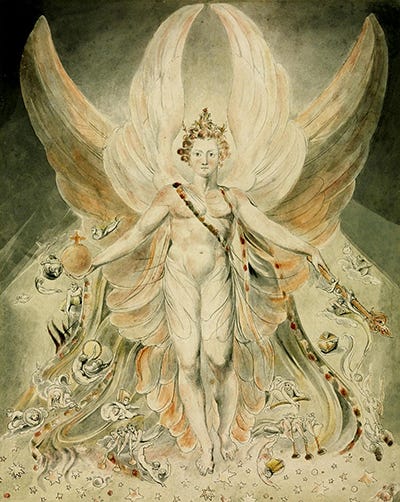
In modern spirituality, there is quite a hangup around the ego.
One hears all about the need for the occasional ego-death, or how the “ego is the enemy,” and so forth.
But what is the ego actually about?
The Ego
Ego is Latin for I. The ego, then, refers to the perception of oneself as an individual. It’s your self-image.
Why is the ego supposedly bad, and should it be obliterated?
First of all, one should know that it cannot be obliterated. One should also know that it is precisely the ego that wants to obliterate itself.
Let’s go a bit deeper into what it is.
I said it’s your self-image. It is, thus, a product of your imagination. It exists in your mind; it is what you think about when you think about yourself. It is the notion of yourself as a separate entity, functioning independently in the world in charge of your life.
What most don’t understand is that we inherit our conception of ourselves entirely from our culture and those we grow up around. You didn’t develop the language you use, and exactly as little did you develop your image of yourself. You picked it up in your upbringing from those around you. Your parents gave you the name you grew to identify with, and more subtly, you began to weave a story in your mind about what this ego is like; what you like, dislike and are like in general.
But rarely does it dawn to one that this ego is actually only a story; a string of thoughts about qualities one possesses.
In what is called an ego-death—often a feature of a psychedelic experience, and more broadly, a mystical experience—momentarily, the mental faculties responsible for the identification with this ego-image loosen. In a mystical state of mind, the habitual conceptualization of reality seizes, and thus also the notion of oneself as an ego-identity also dissolves.
Without the ego-identity, one could not distinguish oneself from the world around him—and thus it is in the human world a very useful thing. But the price to be paid for the ego-identity is the notion of oneself as something separate from the world around him; from his fellow man and everything else. In the experience of ego-death, then, this notion of alienation melts away and the true relationship of oneself as a direct, inseparable part of the reality around him is made manifest to him.
So, to repeat: ego-death is merely the experience in which the true nature of the ego is made clear, in that it is seen for what it is: a string of thoughts with no substantial reality of its own. In Buddhism, this is part of what is meant with anatman, the notion of non-self.
Now, we understand that the ego does not have a substance of its own, and that it is merely a story in one’s and others’ imagination.
What often follows this realization in people lacking a certain spiritual maturity is the need to keep affirming how the ego is illusory. This is how you can tell someone is full of shit: if they go around saying how the ego is the enemy and how it must be destroyed, they are showcasing that they are still under its illusion. For if it is nothing but a string of thoughts, what’s there to be done to it? If it has no existence of its own, only the existence you give to it with your participation, how could it possibly do anything?
Indeed, going about fixated on the ego, in the effort to “kill it” one especially keeps it alive and strong.
The only danger related to the ego lies in being oblivious to it. Now, let’s move to the bolder connection…
The Devil

Here’s a spoiler: the ego is the devil.
The devil is a mythological character in certain religious traditions. In popular Christianity, the devil—or Satan or Lucifer—represents everything in the universe that is evil; that is, that goes against the good will of God. In Judaism, though, what’s cognate to the devil is the notion of yetzer-hara, the inclination towards evil acts in all humans—but it is not seen as something to be obliterated.
In many myths, Satan was originally an angel in heaven who thought he knew better than God, and thus descended to earth in an effort to be independent from God and create his own reign. This is also called his fall from Grace. Adam and Eve’s fall from Grace motivated by the serpent—who is often conflated with the devil in Christianity—is essentially the same thing: they ate from the tree of knowledge, and began thinking they know more than they actually do, that they have the vision of the omnipotent God as still separate entities.
Here’s the crux: the devil thinks he knows better than God.
What does this mean?
“God” is a symbol for the totality of reality; for the force(s) upholding everything in this universe, beyond the voluntary control of individual beings.
The devil thinks he knows better how to manage himself and the world than God, and thus decides to fulfill his own will and create his own reality on the earth as distinct from fulfilling his God-given role in the harmonious world of Heaven.
The devil thinks he’s separate from God, i.e., from reality beyond his idea of himself.
The devil tries to mould the world according to his own will, with the effect of creating disharmony and destruction in the world. He also is the source of suspicion and doubt—the Hebrew word for satan originally meant “accuser,” and the role of the devil was often imagined to be the accuser in a courtly setting (hence the idiom of playing the devil’s advocate).
Do you see the connection?
The devil is a human being when he is taking himself—that is, his ego-identity—seriously, and thinks that he is actually in charge of himself and the world around him.
The devil has a hold on someone when they are deceived by the illusions of their thought; when they think following that chaotic voice in their head will bring them lasting fulfillment or peace. Indeed, the chaotic voice of an unsettled, suspicious cognition is what is meant with many references to the devil; whereas the quiet, calm, encouraging inner feeling that is intuition is often referred to as the voice of God. The Fall from Grace happens every moment a human being is self-conscious, and trusts rather his partial perception as an ego-entity instead of his intuition.
Sin
The acts of sin advised against in scriptures—greed, lust, gluttony…which are often thought to be the temptations posed by the devil—are acts of self-gratification or self-indulgence.
They are actions that enforce the notion of oneself as something separate from everything around him. They are actions whose aim is to try to satisfy the desires of this ego-self, not to advance the individual towards harmony and unity with the cosmos or God. And the reason they are advised against is not because a “sky daddy” will punish humans for breaking his laws: it’s because they create dissatisfaction, disharmony and destruction in the individual—and also the world around him (because they are not separate!)—who indulges in them.1
Hell, which is often imagined as the devil’s dwelling place onto which a soul ends up after sinning, is not a place awaiting after death. Hell is precisely the effort of trying to fulfill the desires of this ego-self; the effort—or rather the consequent sensations and manifestations—of trying to have reality be something other than it is right now.
Now, after having drawn a connection between the ego and the devil, I must ask the reader not to jump into a conclusion about needing to obliterate the ego.
Really, the most constructive thing one can do about the ego is to practice observing reality in a state of nonjudgmental awareness—for then it becomes obvious that one is actually not the perceived thinker or doer, the ego-self in charge of anything, but that that’s all just a stream of thoughts among the rest.
What one really is, is the whole totality; the undifferentiated awareness which remains when one stops participating in thought reactionarily.
As I said, the ego is most dangerous when one is oblivious to its existence. “The greatest trick the devil pulled was convince people he doesn’t exist.” Nobody is more dangerous than someone who thinks he knows everything about everything; and only people who have not confronted themselves can think so. And those most actively suppressing their egos and their bad habits associated with it often turn out to be the most destructive and deceptive individuals.
If you want to outwit the devil, it is extremely important that you don't give him advanced notice. Even if you only announce to yourself your intentions, the devil will know, because who do you think the devil is?
— Alan Watts
Thank you for reading.
Generally, all moral codes in religions are not there to enforce order, but to aid people in living fluid and harmonious lives—and “God punishing humans” is just a euphemism for humans punishing themselves with their own actions.



